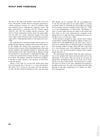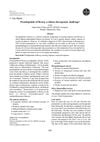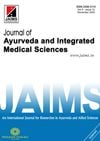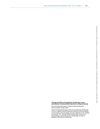 17 citations,
April 2020 in “Dermatology and Therapy”
17 citations,
April 2020 in “Dermatology and Therapy” The PRP-like cosmetic product with postbiotics effectively treats hair loss in Alopecia areata.
 13 citations,
April 2001 in “International Journal of Dermatology”
13 citations,
April 2001 in “International Journal of Dermatology” Different types of scarring alopecia may be stages of one disease, and accurate diagnosis is crucial to prevent permanent hair loss.
 5 citations,
March 2011 in “Journal of pediatric health care”
5 citations,
March 2011 in “Journal of pediatric health care” The girl with autoimmune hair loss might regrow hair within a year, and treatments can help but not prevent recurrence; dermatologist referral and corticosteroids are recommended.
 4 citations,
October 2016
4 citations,
October 2016 Herbs like aloe vera and amla are effective and safe for treating hair loss.
 2 citations,
April 2015 in “S. Karger AG eBooks”
2 citations,
April 2015 in “S. Karger AG eBooks” The document concludes that successful surgical repair of scalp and forehead issues requires careful planning and various techniques depending on the injury or defect size.
 2 citations,
December 2014 in “Research & Reviews: Journal of Pharmacy and Pharmaceutical Sciences”
2 citations,
December 2014 in “Research & Reviews: Journal of Pharmacy and Pharmaceutical Sciences” Carrot extract in gel form may help hair grow better.
 1 citations,
October 2020 in “Journal of Investigative Dermatology Symposium Proceedings”
1 citations,
October 2020 in “Journal of Investigative Dermatology Symposium Proceedings” Platelet-Rich Plasma treatment improved hair growth and reduced inflammation in patients with patchy hair loss, but not in total hair loss, and Optical Coherence Tomography was useful in tracking this progress.
 1 citations,
January 2020 in “Benha Journal of Applied Sciences”
1 citations,
January 2020 in “Benha Journal of Applied Sciences” Certain gene variations may increase the risk and severity of alopecia areata.
 1 citations,
January 2014 in “Health Renaissance”
1 citations,
January 2014 in “Health Renaissance” Pseudopelade of Brocq is hard to diagnose and treat, with limited effective options.
 1 citations,
January 1967 in “The BMJ”
1 citations,
January 1967 in “The BMJ” The document concludes that while some hair and scalp disorders can be treated, hair loss from destroyed follicles is permanent, and damaged hair can only regrow naturally.
 March 2024 in “Buletin de psihiatrie integrativă (Print)”
March 2024 in “Buletin de psihiatrie integrativă (Print)” Hair loss from telogen effluvium can cause mental health issues and lower life quality, needing both medical and emotional support.
 February 2024 in “Journal of ayurveda and integrated medical sciences”
February 2024 in “Journal of ayurveda and integrated medical sciences” Ayurvedic treatments helped a 16-year-old regrow hair after modern medicine failed.
 January 2024 in “Frontiers for young minds”
January 2024 in “Frontiers for young minds” Alopecia is a condition causing hair loss that can impact looks and mental health.
 January 2024 in “American journal of clinical dermatology”
January 2024 in “American journal of clinical dermatology” Ritlecitinib is safe and well-tolerated for treating alopecia areata in patients aged 12 and older.
 December 2023 in “Journal of health and rehabilitation research”
December 2023 in “Journal of health and rehabilitation research” Oral Apremilast effectively treats alopecia areata in most patients.
 December 2023 in “Medical & Clinical Case Reports Journal”
December 2023 in “Medical & Clinical Case Reports Journal” Ayurvedic treatment, including leech therapy, can effectively regrow hair in alopecia areata.

TCA injections are more effective and safer than cryotherapy for treating alopecia areata.
 January 2021 in “Journal of Allergy and Therapy”
January 2021 in “Journal of Allergy and Therapy” Electric Follicle Stimulation may promote hair growth and density with no known side effects.
 February 2020 in “Our Dermatology Online”
February 2020 in “Our Dermatology Online” A synthetic drug and a South American herb may help treat alopecia areata in Chinese men.
 December 2014 in “Research and Reviews: Journal of Pharmacology and Toxicological Studies”
December 2014 in “Research and Reviews: Journal of Pharmacology and Toxicological Studies” Cabbage extract in hair gel may promote hair growth and could help treat hair loss.
 January 2011 in “Der Pharmacia Lettre”
January 2011 in “Der Pharmacia Lettre” Pig oil was found to significantly promote hair growth in rats, more effectively than Minoxidil.
 March 2021 in “Dermatological reviews”
March 2021 in “Dermatological reviews” Hair transplant works well, but needs more research for better results.
 64 citations,
July 1997 in “Journal of The American Academy of Dermatology”
64 citations,
July 1997 in “Journal of The American Academy of Dermatology” Finding eosinophils near hair bulbs helps diagnose alopecia areata.
 51 citations,
January 2014 in “Pediatric Clinics of North America”
51 citations,
January 2014 in “Pediatric Clinics of North America” The guide explains how to identify and treat children's hair loss, including fungal infections, autoimmune disorders, hairstyle changes, self-correcting conditions, and behavioral therapy for hair-pulling.
 41 citations,
September 2018 in “Australasian journal of dermatology”
41 citations,
September 2018 in “Australasian journal of dermatology” No systemic treatment for alopecia areata has strong evidence of effectiveness.
 37 citations,
May 2016 in “Deutsches Arzteblatt International”
37 citations,
May 2016 in “Deutsches Arzteblatt International” Hair loss requires customized treatments based on its various causes and types.
 33 citations,
August 1973 in “American Heart Journal”
33 citations,
August 1973 in “American Heart Journal” Propranolol can cause reversible hair loss.
 32 citations,
January 2005 in “Journal of The American Academy of Dermatology”
32 citations,
January 2005 in “Journal of The American Academy of Dermatology” Some babies are born with alopecia areata, and a treatment with clobetasol propionate can regrow hair in half of the cases.
 24 citations,
November 2007 in “Journal of Investigative Dermatology Symposium Proceedings”
24 citations,
November 2007 in “Journal of Investigative Dermatology Symposium Proceedings” Hair and scalp disorders significantly affect self-esteem, and using cosmetic products like conditioners and styling aids can improve hair health and appearance.
 13 citations,
February 2016 in “Clinical Medicine”
13 citations,
February 2016 in “Clinical Medicine” The document concludes that diagnosing and treating hair loss is complex and requires understanding its psychological effects and underlying causes, while also calling for more research and new treatments.






























